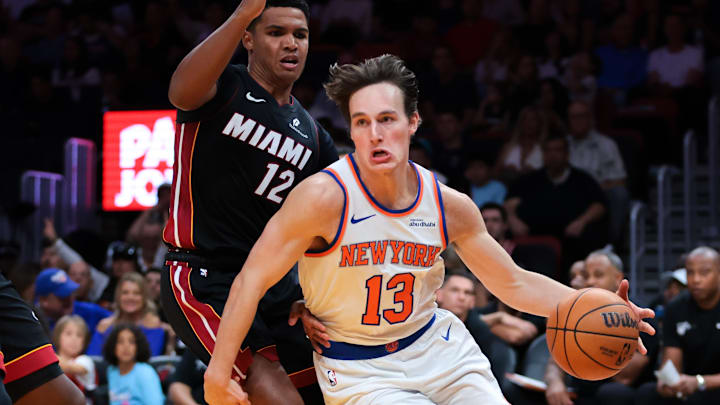Six hundred and twenty-four. That is the number of minutes last season played by Tyler Kolek, Ariel Hukporti, and Pacome Dadiet. Combined. The New York Knicks are paying the price for that now.
Depth was supposed to be a strength of this year’s roster. It’s not. On the contrary, their depth has been among their biggest issues.
Head coach Mike Brown might be dusting off 10 to 11 guys every night, but that doesn’t mean they’re all playing like net positives. If the roster isn’t navigating absences from Mitchell Robinson and Miles McBride, it’s getting rocked by the play of Jordan Clarkson and Guerschon Yabusele, who are, as of now, two of the league’s most overrated offseason additions.
Then, of course, the Knicks have Karl-Anthony Towns seesawing his way through a pretty serious quad strain. Josh Hart is fresh off missing time with a back injury, and attempting to play through a finger issue on his shooting hand that will inevitably require surgery. It’s not going well.
Viewed all together, this onrush of unfortunate curveballs is enough to derail most squads. Never mind New York is supposed to be among the exceptions. It isn’t the aggregate issue that’s the problem. It’s the Knicks’ inability, so far, to solve a single one.
The Knicks youngsters needed more experience
Please don’t interpret this as an attempt to drum up unnecessary drama. Nor is it a claim that New York has somehow buried a burgeoning star on the depth of its bench.
The Knicks do not have a blue-chip youngster. Dadiet was drafted 25th overall in 2024, and his spot on this year’s roster was far from assured. Kolek was selected 34th in the same draft. Hukporti was taken at No. 58, also in 2024
Contenders are not supposed to lean on prospects, let alone ones selected so late in the process. Grooming young talent is also difficult while attempting to win, and no one’s claiming it’s easy. It requires a level of experimentation and sacrifice—an iron stomach.
Last year’s Knicks didn’t have it. Then-head coach Tom Thibodeau rolled with his guys, leaving the team with very little information on its youngsters. Fans were left to assume they weren’t ready, or that they weren’t standing out in practice. Both could be true.
It would have nevertheless been useful to know just how far away they were by punting on some wins in favor of self-exploration. Maybe one of them is further along than they are now. At the very least, the Knicks would know whether they are ready for rotation minutes, and finagled their offseason accordingly.
New York is figuring it out on the fly now
None of this is to paint Kolek, Dadiet, or Hukporti as lost causes. But the readiness level for all of them is questionable.
Hukporti is probably the best of the trio, and he’s clearly not ready to anchor the center spot for more than short bursts in ultra-specific matchups. The Knicks desperately need a backup playmaker. Kolek has made some nice reads in limited burn but is turning the ball over on nearly 21 percent of his offensive possessions. Imagine how much more seasoned he might be if he received more than 296 total minutes last season.
New York has zero veteran reserve wings on the bench aside from Hart. That’s an issue even if he’s healthy, and playing up to snuff. He’s doing neither.
Wouldn’t it be nice if Dadiet could sponge up some of those minutes? Instead, he’s behind rookie Mohamed Diawara in the rotation, which would actually be an encouraging sign for the Knicks’ developmental approach, if Diawara were actually in the rotation.
This wouldn’t be a problem if New York was in perfect health, and if Yabusele, Clarkson, and Landry Shamet were all taking care of business. The reality is, the Knicks placed too much stock in wild cards as potential regulars.
Perhaps this was unavoidable. There’s no guarantee Hukporti, Kolek, or Dadiet would be better than they are now if they’d received more minutes last year. At least, however, the Knicks would have known. Now, they’re tasked with finding out when they actually need one or more of them—or they’re destined to avoid investing in them altogether, perpetuating the same flawed process that’s contributing to the uncertainty they face now.
